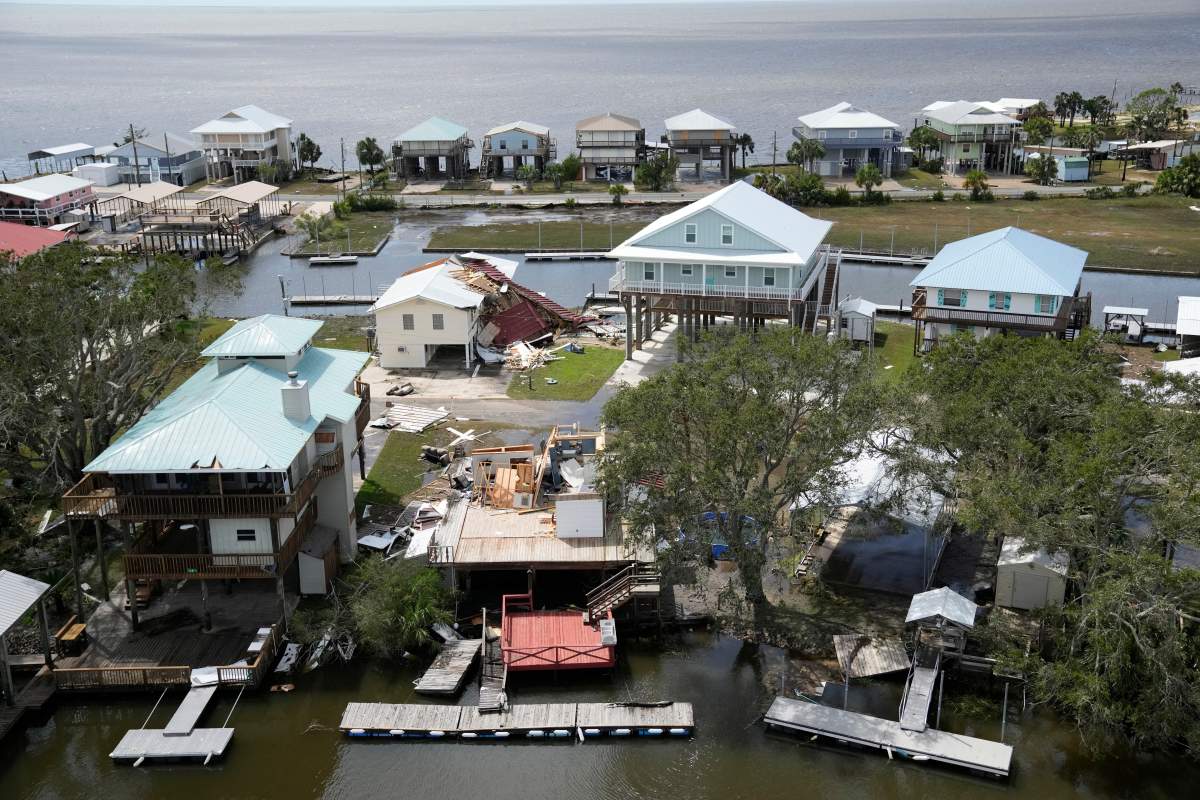Hurricane Idalia lashed Florida on Wednesday, leaving a trail of destruction across the state’s Big Bend area before moving into neighbouring states.

Downgraded now to Tropical Storm Idalia, it’s moving through the Carolinas Thursday and will then move offshore over the Atlantic Ocean.
Idalia ripped through Florida quickly, splitting trees in half, ripping roofs off hotels and turning small cars into boats before sweeping into Georgia and South Carolina as a still-powerful storm that flooded roadways and sent residents running for higher ground.
Idalia made landfall near Keaton Beach, Fla., at 7:45 a.m. Eastern Wednesday as a Category 3 hurricane with maximum sustained winds near 205 km/h. It remained a hurricane as it crossed into Georgia with top winds of 150 km/h. It weakened to a tropical storm by late Wednesday afternoon, and its winds had dropped to 96 km/h by Wednesday night.
As the eye of the storm moved inland, high winds shredded signs, blew off roofs, sent sheet metal flying and snapped tall trees.
One person was killed in Georgia. No hurricane-related deaths were officially confirmed in Florida, but the Florida Highway Patrol reported two people died in separate weather-related crashes just hours before Idalia made landfall.

The storm brought strong winds to Savannah, Ga., Wednesday evening as it made its way toward the Carolinas.

Get breaking National news
Idalia spawned a tornado that briefly touched down in the Charleston, S.C., suburb of Goose Creek, the National Weather Service said. The winds sent a car flying and flipped it over, according to authorities and eyewitness video. Two people had minor injuries.
Florida had feared the worst of Idalia. It is still recovering from last year’s Hurricane Ian, which hit the heavily-populated Fort Myers area, leaving 149 dead in the state.
Unlike that storm, Idalia blew into a very lightly inhabited area known as Florida’s “nature coast,” one of the state’s most rural regions that lies far from crowded metropolises or busy tourist areas and features millions of acres of undeveloped land.
However, major damage was dealt. Water flooded streets near the coast, unmoored small boats and nearly a half-million customers in Florida and Georgia lost power.
In Perry, Fla., the wind blew out store windows, tore siding off buildings and overturned a gas station canopy. Heavy rains partially flooded Interstate 275 in Tampa, and wind toppled power lines onto the northbound side of Interstate 75 just south of Valdosta, Ga.
Less than 32 kilometres south of where Idalia made landfall, businesses, boat docks and homes in Steinhatchee, Fla., were swallowed up by water surging in from Deadman’s Bay.
State officials, 5,500 National Guardsman and rescue crews were in search-and-recovery mode, inspecting bridges, clearing toppled trees and looking for anyone in distress.
The National Weather Service in Tallahassee called Idalia “an unprecedented event” since no major hurricanes on record have ever passed through the bay abutting the Big Bend.

In Tallahassee, the power went out well before the centre of the storm arrived, but the city avoided a direct hit. A giant oak tree next to the governor’s mansion split in half, covering the yard with debris.
One man was killed in Valdosta, Ga., when a tree fell on him as he was trying to clear another tree out of the road Wednesday, said Lowndes County Sheriff Ashley Paulk. Two others, including a sheriff’s deputy, were injured when the tree fell, Paulk said.
More than 30,000 utility workers in Florida were gathering to make repairs as quickly as possible in the hurricane’s wake. Airports in the region, including Tampa International Airport, planned to restart commercial operations either Wednesday afternoon or Thursday.
By midday Wednesday, more than 900 flights had been cancelled in Florida and Georgia, according to tracking service FlightAware.
Officials in Bermuda warned that Idalia could hit the island early next week as a tropical storm. Bermuda on Wednesday was being lashed by the outer bands of Hurricane Franklin, a Category 2 storm that was on track to pass near the island in the North Atlantic Ocean.
President Joe Biden called the governors of Florida, Georgia, North Carolina and South Carolina on Wednesday and told them their states had his administration’s full support, the White House said.
— with files from The Associated Press and Reuters













Comments
Want to discuss? Please read our Commenting Policy first.